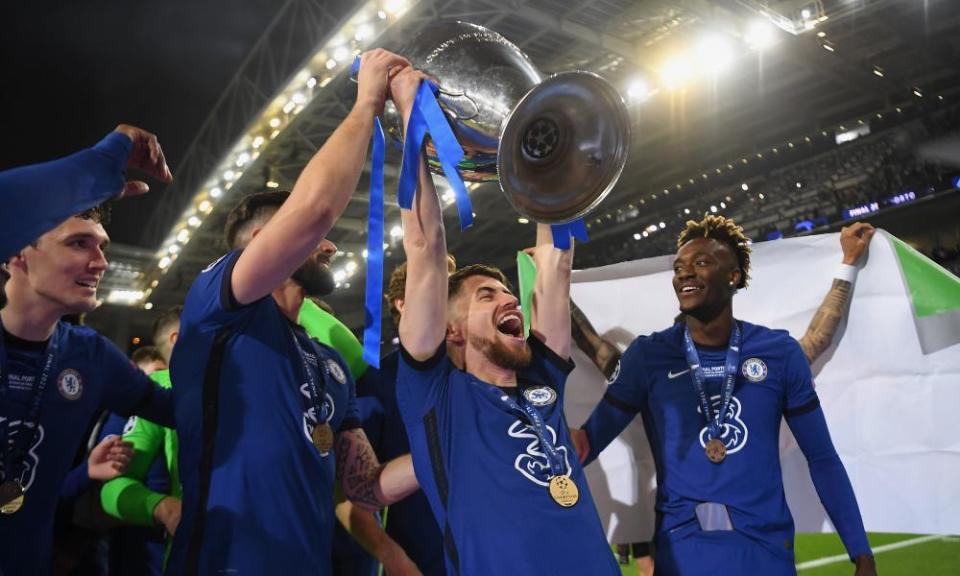Jorginho’s metronomic presence has become the beating heart of Italy
Italy can count themselves fortunate to have a manager who knows how to change his mind. Six years ago, back when Roberto Mancini was still in charge at Inter, he expressed a narrow view of which players ought to represent the Azzurri.
“I think an Italian player deserves to play for the national team,” he said back then. “Those who were not born in Italy, even if they have relatives, do not deserve it, I think. That’s my opinion.”
On Tuesday night at Wembley, a player born in Imbituba, Brazil delivered Mancini’s Italy into the final of Euro 2020. Jorginho sealed a penalty shootout win over Spain with scandalous cool, taking a hop that delayed his shot and offered Unai Simón an extra fraction of a second to show his hand. As the goalkeeper plunged to his right, the midfielder rolled the ball gently into the opposite corner.
It was a moment that called to mind Andrea Pirlo’s chipped penalty beyond Joe Hart at Euro 2012, a strike that made a mockery of the tension that every other person inside the stadium was feeling. Pirlo would later describe his choice as a deliberate act of gamesmanship, designed to make the keeper look small so that his teammates would not feel intimidated when their turn came.
Jorginho had no such incentive. After Álvaro Morata missed for Spain, he knew that his penalty could be the last. It might have looked like showing off, but Jorginho insisted afterward that he had only been going back to basics. “I tried to forget what was going on around me and do the thing that I have trained to do,” he told Italy’s Sky Sport. “I took a deep breath and tried to stay calm.”
He had done a fine job of that all evening, just as he has throughout Euro 2020 so far. Jorginho’s metronomic presence has been a constant for Italy, the steady rhythm of his passing setting a tempo at which the teammates around him can thrive.
His efforts are not always as eye-catching as some others. Up until Tuesday’s penalty, there might not have been one signature moment of his to remember from this tournament. And yet, in Italy he was being touted even before the semi-final as a candidate to win this year’s Ballon d’Or – a recognition of his contribution not only to the national team but also a Champions League-winning side at Chelsea.

“If he win the Euros as well then of course he would [deserve it],” said Maurizio Sarri, the player’s former manager at Napoli and Chelsea, during an interview with Sportitalia before the game. “He’s a refined player, one that not everybody can understand. You need to put your eyes on him and only watch him during a match. He’s so good and so intelligent that he makes everything look easy, it’s rare that the lingering image will be spectacular.”
Few things looked easy for Italy against Spain. Leonardo Bonucci described it as “the most difficult match of my life”. Mancini has built his team’s identity around a desire to hold the ball and dictate play, but at Wembley they finished with little more than 30% possession, unable to wrest control from a Spanish midfield in which the teenager Pedri did not miss a single pass until the 102nd minute.
At those times when Italy seemed most in danger of drowning, however, Jorginho was a lifejacket keeping them afloat. His eight interceptions were the most, according to Opta, made by any player in a match at the last two European Championships.
Mancini had made six substitutions by the end of extra time, the adjustments coming so frequently during the final part of the evening that Italy started to resemble an ice hockey team changing lines. Never was there any question, however, that Jorginho would stay on the pitch to the end.
His reliability as a penalty taker was doubtless a consideration for Mancini, but the manager has been loth to remove him under any circumstance. Jorginho has started every game at Euro 2020 and only been substituted once, with a quarter of an hour left to play in the final group game against Wales. He has played 585 minutes in total – more than any other Italy player except the goalkeeper, Gianluigi Donnarumma.
Jorginho is yet another symbol of the transformation in this Italy since their catastrophic failure to qualify for the World Cup in 2018. His first competitive game for the Azzurri came in the second leg of their play-off defeat to Sweden.
Related: Italy suffer for shootout win in emotional and authentic tournament tussle | Barney Ronay
There had been pressure on Giampiero Ventura to give the player a chance before Brazil claimed him instead. Jorginho owed his eligibility for Italy to a great-grandfather, but he feels no ambiguity in his attachment to a country where he spent formative years, having moved there at the age of 15. Earlier in this tournament he was asked about how it felt to sing the anthem before games and replied: “I sing it with feeling. I feel it deep inside. Me and my teammates.”
After scoring his penalty, he led those teammates in the charge toward the Italian end of Wembley: a roiling sea of blue shirts and tricolore flags. Mancini was back in the technical area, locked in an embrace with his coaching staff.
Perhaps it was one among that close-knit group who helped him to change his mind about players’ birth certificates. Perhaps, as Mancini has acknowledged in interviews on different topics, getting older simply changes your outlook. What we know is that this Italy team would not be the same without Jorginho. And without the stage that this tournament has provided, Jorginho might not be gaining traction – in Italian eyes at least – as a candidate for the Ballon d’Or.

 Yahoo Sport
Yahoo Sport 





































